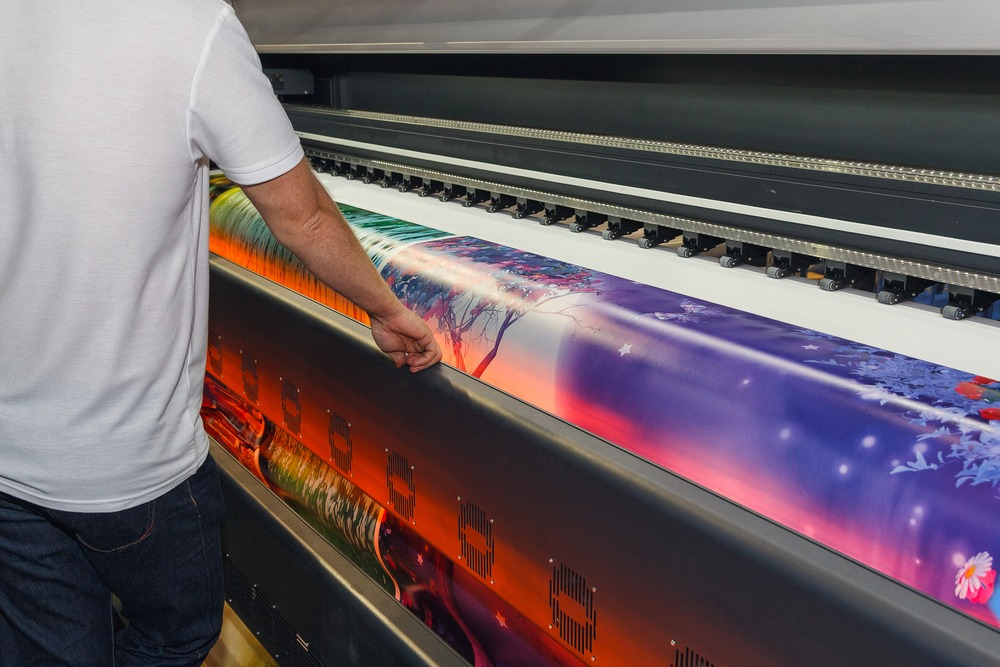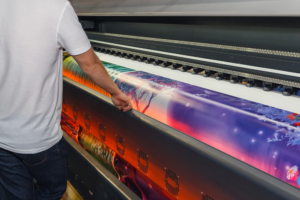The textile industry is on the edge of revolutionary transformation with the advent of new technologies that are going to change how humans think about designing, making, and experiencing textiles in 2025.
Textile technology and innovations are going to be at the forefront of science and the environment in making functional, smart, eco-friendly, and personalised textiles.
Read through the blog to unravel the latest textile technology and innovations in the textile industry with updated data and key services.
As per reports, it is expected that the textile market size will reach US$ 903.45 billion in 2028 with a CAGR of 7.0%.
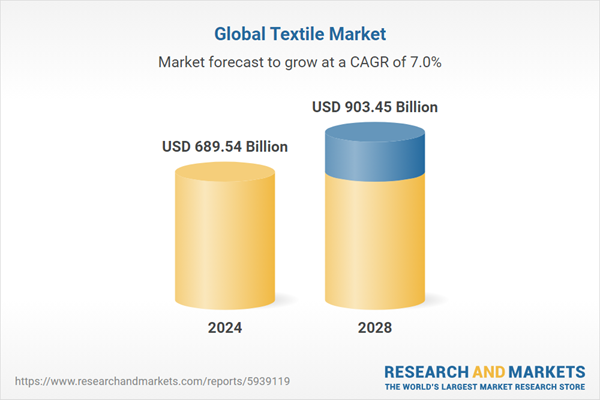
(Source: Research and Markets)
The use of blockchain technology in manufacturing processes and digital platforms for textile supply chain management are coming into play.
Technology and IT companies are concentrating on their areas of expertise to develop smart fabrics through collaborative efforts.
Robotics and automation with AI are changing how the world operates, and you should also see some joint ventures and collaborations regarding new ideas in product development.
Top 7 Emerging Textile Technologies Influencing the Industry
1. Additive manufacturing
Additive manufacturing refers to emergent textile technologies like multi-material printing, incorporation of conductive filament and 4D printing.
This enables the textile industry to provide individually tailored sustainable fabrics as per the customer’s preference, introducing its complex structures and functional designs, as well as incorporating sensor inclusion in smarter technologies.
Like that, sustainability will be complemented with the right amount of material required along with recycling possibilities for these new micro- or bio-based fabrics.
The Additive Manufacturing Report 2024 illuminates the impressive growth of the sector with an industry growth of as high as 9.34% over the last year.
Manufacturers are now capable of conducting tests and modifications of important components inside machines—from loom alterations to textile cutters—very quickly and flexibly using advanced materials such as carbon fibre composites and high-strength polymers.
2. Nanotechnology in Textiles
The application of nanotechnology to textiles has given them numerous spectacular properties, such as water resistance, anti-microbial control, and ultraviolet protection from environmental influences.
Smart textiles have been developed with improvements in strength and functionality due to nanomaterials such as carbon nanotubes and metal oxides.
The market for nanotechnology textiles grew from $7.16 billion in 2023 to $8.91 billion in 2024 at a compound annual growth rate of 24.4 percent.
It is expected that by the end of 2028, it will grow at a compound annual growth rate of 23.1 percent to $20.43 billion.
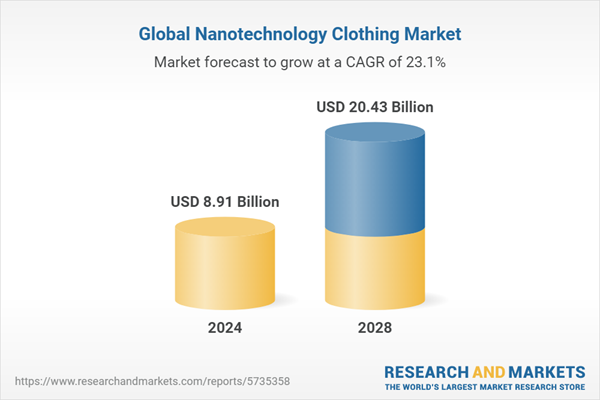
(Source: Research and Markets)
3. AI and Machine Learning in Textile Design
Machine learning will not merely predict trends in fabrics but also personalise fabrics according to customers’ preferences, automate textile design with artificial intelligence, and optimise textile manufacturing processes.
The artificial intelligence will simulate the behaviour of many other common materials, thus enabling the designer to run tests, for example, prototype fabrics virtually.
The Global Artificial Intelligence in Textile Market is expected to grow to around USD 21.4 billion in 2033, with a cumulative growth rate of 24.6% between 2024 and 2033, up from USD 2.4 billion in 2023.
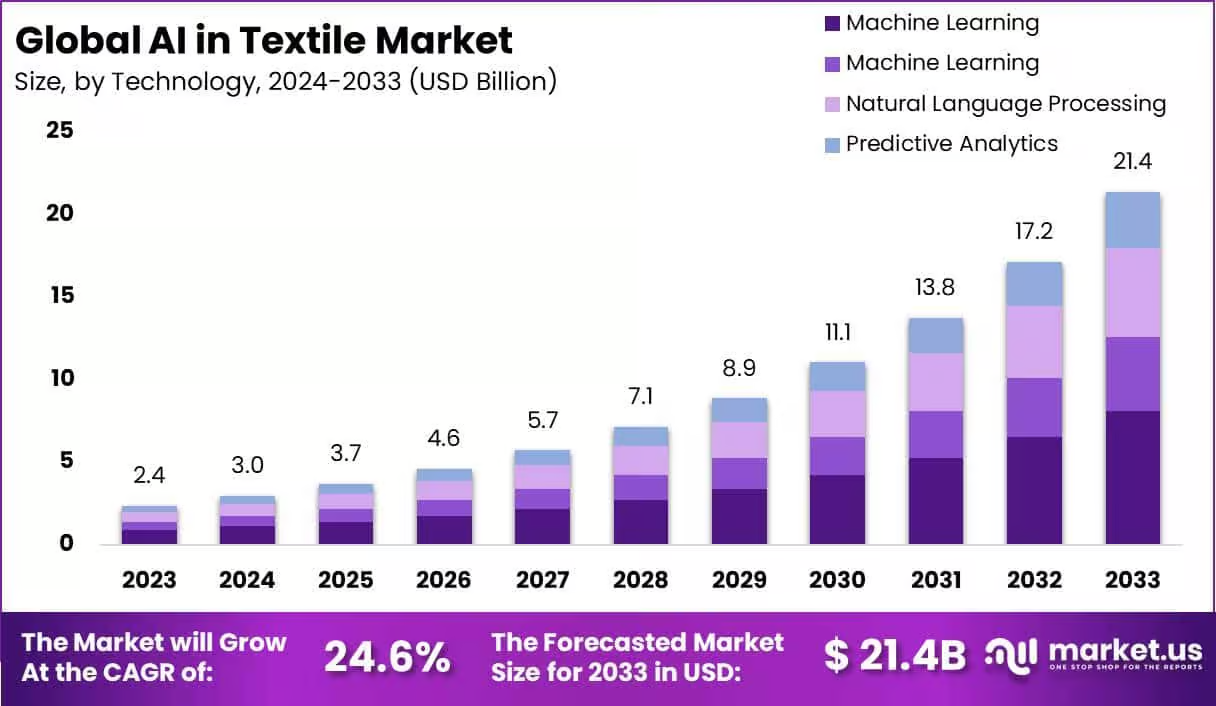
4. Advanced Blockchain Technology
The best revolutions in textile technology will include digital solutions aimed at promoting transparency, sustainability, and ethics along the supply chain.
Such a textile technology would trace each stage of textile production from raw materials to distribution and ensure that the supply chain is safe and, in particular, enhance consumer confidence.
Higher-level functionalities, such as cryptographic seals and their digital twins, go so far as to follow up on physical merchandise to prevent and confirm the counterfeiting of the products and their authenticity.
5. Top-Notch Fabric Finishing Technologies
In 2025, plasma treatment will emerge as a new-age textile technology that improves the surface properties of fabrics by employing a completely eco-friendly process.
Low-energy plasma treatments on the surface of textiles alter the molecular structure of the material and introduce desirable properties like water repellency, stain resistance, and higher durability.
All these improvements are possible through plasma treatment while avoiding harsh or toxic chemicals or solvents, making this process an extremely green alternative compared to traditional finishing methods in textiles.
6. IoT in Textile Technology
By 2025, the field of textile technology will be significantly transformed by the Internet of Things.
Smart sensors integrated into a fabric will help monitor parameters such as temperature, fire production monitoring, quality control and defect detection.
IoT-enabled textiles will also change the ways fabrics can be used and customised while also making better use of energy and resources. This will give industries smarter, more efficient utilities.
The market for IoT in textile technology is expected to reach $25 billion by the year 2027; CAGR is about 11.5%. About 70 per cent of textile firms using an IoT solution have reported savings within three years of implementation.
7. Big Data Analytics
Textile manufacturers can optimise their production processes using enormous data harvested from IoT-enabled machines, RFID tracking, and consumer behaviour analysis.
This textile technology helps them minimise downtimes through predictive maintenance models while strengthening the transparency of their supply chains.
The same real-time data permits more accurate control over quality assurance, making room for the identification of defects at finer-grained levels. This textile technology will streamline production process and supply chain management in 2025.
Texcoms Worldwide – Your Trusted Partner in the Textile Industry
Texcoms Worldwide is committed to innovating, sustaining, and growing in the textile sector. All of our many services, including refurbished textile machinery trading, consultancy services related to textiles, and fibre, yarn, and fabric trading, are dedicated to offering high-quality solutions customised to fit the requirements of our clients.
We utilise advanced textile technologies like AI, IoT, and additive manufacturing to keep our clients abreast of industry trends, enhance efficiency, and promote environmental sustainability.
We build engagement and networking globally, empowering textile professionals in their operations to share and study over a wide spectrum.

